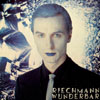Riechmann, "Wunderbar"
 The unfortunate victim of a knife attack three months before the release of this album, Wolfgang Riechmann's credentials extend far beyond this, his only solo record, which is finally getting the reissue treatment. An early collaborator with Neu!'s Michael Rother and Kraftwerk's Wolfgang Fluhr, Riechmann introduced himself as an individual voice within the broad boundaries of '70s German electronic music with a focused minimalism and clear pop sensibility.
The unfortunate victim of a knife attack three months before the release of this album, Wolfgang Riechmann's credentials extend far beyond this, his only solo record, which is finally getting the reissue treatment. An early collaborator with Neu!'s Michael Rother and Kraftwerk's Wolfgang Fluhr, Riechmann introduced himself as an individual voice within the broad boundaries of '70s German electronic music with a focused minimalism and clear pop sensibility.
To be fair—as with much of the material from this era and locale—much of the sound on the record does read as a bit dated in the electronically advanced age we currently reside in. Analog sweeps and crude drum machines abound, but the constructions are still wholly tangible, imbuing the disc with a certain gratifying sense of nostalgia removed from the purely silly sound of a record whose time has come and gone. Despite the epic grandeur of a track like "Silberland," whose regal tempo is occupied by video-game worthy melodies, the careful choice of sounds, crystalline and hollow all, keeps the piece moving into truly spacious territory.
The opening title track is perhaps the most redundant offering on the disc in fact, its phased beat looping along a simple melody and dour vocal. The track could just as easily be a Kraftwerk circa Autobahn, but Riechmann's solo approach means that there is never any more present than is necessary, and no line contributes worthlessly. Even Riechmann's relatively unconvincing vocals are so of their era that they add a sort of baroque human element into the fold.
That said, most of the material here is instrumental, and in this realm Riechmann is truly adept. "Weltweit" shimmers with barely two sounds present, gliding on glacial tracts that grow as another line joins in and they are allowed to mingle and internally shift. This is clearly someone who requires very little to do quite a lot, exhibiting the same pointed melodic strength as Roedelius if devoid of some of the classical jovialism of the latter's solo output. Elsewhere, "Himmelblau" billows with ethereal tones that careen about before tightening their focus and growing into one of the most overtly forward-looking tracks on the album, revealing New Wave and even early House disciples through its child-like melodic line.
The all too brief closer, "Traumzeit" seems to point towards more from this young artist. Yet even in this debut, one genuinely feels like they can hear what might of been—his predeliction for long, drawn out pseudo-dance constructions could well have taken him into the '80s with more than was necessary. Perhaps no great revelation, the album is still a fantastic example of its sound, and does display more than a hint of distance from the usual crowd. There's almost a David Byrne-like melancholy buried beneath these chilly atmospheres, though maybe that's just the cover talking.
samples:



